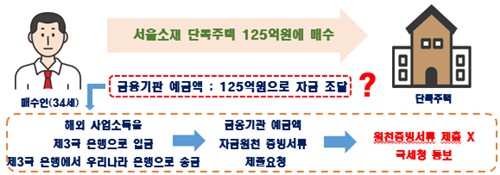
(Seoul=Yonhap Infomax) Dong Il Joo —
South Korean authorities have identified 210 suspected illegal transactions involving foreigners purchasing domestic housing, including false reporting, illegal inflow of overseas funds, and unauthorized leasing activities.
The government emphasized it will take stringent action against unlawful conduct by foreigners in the process of acquiring residential properties.
The Real Estate Supervision Task Force under the Office for Government Policy Coordination convened the 2nd Real Estate Illegal Activity Response Council at the Government Complex Seoul on the 17th, sharing the seriousness of 210 abnormal housing transactions by foreigners detected by the Ministry of Land, Infrastructure and Transport (MOLIT), and agreed to impose the strongest possible measures.
The council included representatives from the Ministry of Economy and Finance, Ministry of Justice, Ministry of the Interior and Safety, MOLIT, Financial Services Commission (FSC), National Tax Service (NTS), and National Police Agency.
MOLIT investigated 438 abnormal housing transactions by foreigners between June last year and May this year, uncovering 290 suspected violations across 210 cases.
Key types of suspected violations included:
- False reporting of transaction amount and contract date (162 cases)
- Improper gifting and similar acts (57 cases)
- Illegal inflow of overseas funds (39 cases)
- Name lending and similar acts (14 cases)
- Misuse of loans for purposes other than intended (13 cases)
- Unauthorized leasing business (5 cases)
For example, one foreign buyer acquired four residential properties in Seoul, bringing in 570 million won ($430,000) in cash without declaring the foreign currency inflow, or sourcing funds via “hwanchigi” (illegal currency transfer) from acquaintances of the same nationality—raising suspicions of illegal overseas fund inflow. Another foreign buyer purchased a Seoul property for 12.5 billion won ($9.4 million), funding the entire amount through bank deposits but failed to clarify the source of business income earned abroad, while domestic employment income averaged only 90 million won ($68,000) per year, making the source of funds unclear.
MOLIT has conducted annual planned investigations into speculative real estate transactions by foreigners since 2022 to eradicate illegal activities in property acquisition. Investigations into non-residential (officetels) and land transactions by foreigners are scheduled for completion by year-end.
Kim Yong-su, head of the Real Estate Supervision Task Force, stated, “Illegal transactions by foreigners can disrupt order in the domestic housing market and cause significant distress to the public due to market instability. Each agency—including the Ministry of Justice, NTS, Korea Customs Service, and National Police Agency—will take the strictest possible action.”
diju@yna.co.kr
(End)
Copyright © Yonhap Infomax Unauthorized reproduction and redistribution prohibited.

